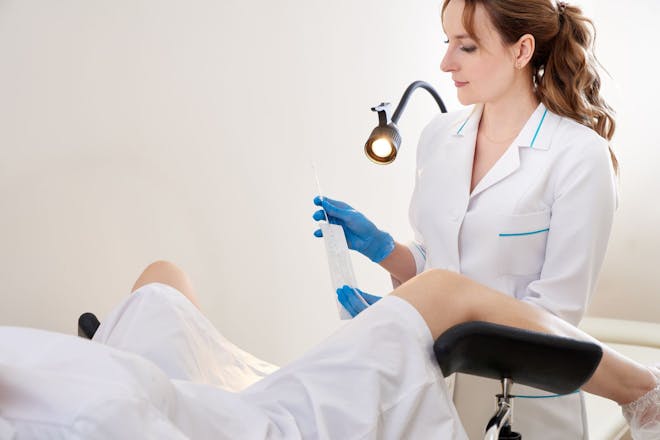Simple test 'could reduce preterm births' ... but the NHS doesn't offer it

Researchers say this simple test could prevent premature births. It's not routinely offered on the NHS. We tell you how to get it
A pregnancy screening test for vaginal bacteria could cut premature births by two-thirds, researchers say.
But there’s a catch for millions of women across the UK because it's not routinely available on the NHS.
In a study of almost 150,000 pregnant women around the world, researchers from Semmelweis University in Budapest, Hungary, say that simple swabs that screen for abnormal vaginal bacteria, could reduce the risk of preterm births ‘by an average of 29%.’
FREE NEWBORN NAPPIES
That's because, the research states ‘the earlier premature birth happens, the more likely an infection will trigger it.’
- Understanding vaginal discharge in pregnancy
- Clearblue test says 2-3 weeks; how far along am I?
- Fun tests to predict your baby's gender
How can this screening reduce premature births?
Preterm birth refers to those that happen before the 37th week of pregnancy and is the leading cause of death of children under the age of 5.
When the balance of good and bad bacteria is upset, it changes the pH of the vagina, from acidic to alkaline.
That allows harmful bacteria to thrive, which in turn can lead to infections, shortening of the cervix and eventually preterm births, the researchers said.

The study – published in the journal Scientific Reports by researchers at Semmelweis University, Budapest, Hungary – says screening could reduce preterm births by alerting women and medical professionals to problems so they can treat infections and stop them from becoming a risk.
The charity Bliss reports that 58,000 babies are born prematurely in the UK each year. Worldwide, more than 13 million babies were born preterm in 2020, according to the World Health Organisation. Around a million of those died as a result.
What about screening in the UK?
The UK National Screening Committee, which advises ministers and the NHS on screening policy, doesn’t currently recommend this type of screening because, 'there is no evidence that it would be able to accurately identify women at risk of having problems in labour', The Telegraph reported.
It also states that 'there is not enough evidence that screening is able to reduce the risk of preterm labour', the paper said.

Why does vaginal bacteria matter?
A healthy vagina is host to a range of bacteria – often called flora – that protects against infections.
The one you may have heard of is lactobacilli. That’s the bacteria that – when it multiples too much – that leads to thrush.
Lactobacilli helps the vagina maintain the proper pH and a healthy balance of flora. Many things can change the pH of the vagina, tipping it from an acidic environment to alkaline.
These include stress, sex, food, swimming in public pools, antibiotics and pregnancy.
How to know if you have abnormal vaginal bacteria
Symptoms that can arise from abnormal vaginal bacteria can include discharge, an unusual ‘fishy’ or unpleasant odour, soreness, burning and pain. However often there are no symptoms.
If you are concerned that you may have a vaginal infection or are suffering from thrush, there are several things you can do.
How can I get screened, then? Advice from Netmums
Tracey Stone, the head of the Netmums Parent Support Service and Drop-In Clinic – as well as an NHS health visitor – has this advice:
- 'If someone is worried, they can talk to their midwife about it and ask for a screening. This doesn't mean that they'll automatically get one though, as this would have to be decided based on assessment and each individual case,' Tracey says.
- Tracey also says you may suggest that your GP does a test based on clinical need, if this outweighs the risks of a vaginal procedure.
- You can also arrange to have the test privately, 'then share the results with their midwife or obstetrician if the results were of concern.'
- Finally, there are over-the-counter tests as well. 'The over counter ones are somewhat reliable, but they are more at risk of potential contamination, as they wouldn't be performed under sterile conditions.' (That is, you're likely to do them yourself at home in your bathroom.)
- 'Results can be shared with your midwife, GP or obstetrician, who may choose to repeat the findings to assess their accuracy if they felt it necessary.'
One thing Tracey says to keep in mind: 'The problems with these screening methods are that these vaginal changes can come and go, so you may test negative to any concerns, but then your experience changes soon after, and visa versa,' Tracey says.
Ultimately, raise any concerns you have with the appropriate medical professional as soon as possible.







